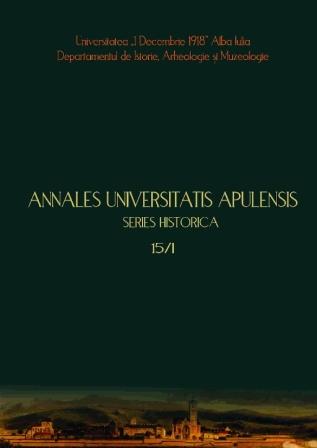Avatarurile unei cariere ecleziastice. Ioan Pataki, de la misionar apostolic latin la episcop unit de rit grec
The avatars of an ecclesiastical career. Ioan Pataki, from Latin Apostolic missionary to Greek rite Uniate bishop
Author(s): Radu NediciSubject(s): History
Published by: Editura Mega Print SRL
Keywords: Latin rite; Byzantine rite; Făgăraş district; missionary activity; Romanian Greek Catholic Church
Summary/Abstract: Benefiting from a spectacular hierarchical rise during the decade when the Habsburgs firmly established their authority over Transylvania, following the peace concluded in 1711, Ioan Pataki was regarded by historians as one of the most remarkable figures of the Romanian élites in the eighteenth century. This study aims at investigating the tortuous course covered by him, from the moment of receiving the doctorate degree in Rome, until the consecration as a bishop in Făgăraş. At the core of the present research lays his correspondence in those years, partly unpublished, dispatched to various offices of the Curia and other notables of great influence at the top of the Catholic Church. Its details are susceptible to help discerning the individual choices that stood at the basis of his career change, after the debuts as Latin missionary of the Congregation “de Propaganda Fide” in the Făgăraş district and the adoption of the Greek rite, in order to facilitate his promotion as Uniate bishop. The letters trace the portrait of a promising young theologian, extremely active in the designated mission territory. The consideration the contemporaries showed towards him, such as the rector of the Germanicum-Hungaricum College in Rome, the Apostolic Nuncio in Vienna and the central and provincial leadership of the Jesuit Order, leave no doubt over the talents that set Pataki apart. Browsing of the same letters also implies observing the very clever manner in which he conducted his career, always emphasising his merits and thickening the lines of reality. Accidentally however, in 1713, the vacancy of the episcopal see of the Romanian Uniate Church presented him with a unique opportunity, which he embraced wholeheartedly, forwarding his candidature and obtaining the nomination as bishop at the end of a well-known institutional battle. Under the vigour by which Pataki defended his cause rested a real personal drama, determined by the pontifical decision of 1716 that imposed him to abandon Roman Catholicism and adopt the Byzantine rite. Despite appearances and official declarations, this metamorphosis was never truly accomplished. Reconstructing the two failed attempts of 1717 and 1720 to persuade the Apostolic See to grant him permission to celebrate in private the Latin Mass offers a clear sign of Pataki’s continued attachment to the liturgical expression of the Roman Church. This was also going to have a major impact over his reforming agenda, which he directed against some of the Eastern rite traditions that were not consonant with his earlier formation.
Journal: Annales Universitatis Apulensis Series Historica
- Issue Year: 15/2011
- Issue No: 1
- Page Range: 181-194
- Page Count: 14
- Language: Romanian
- Content File-PDF

